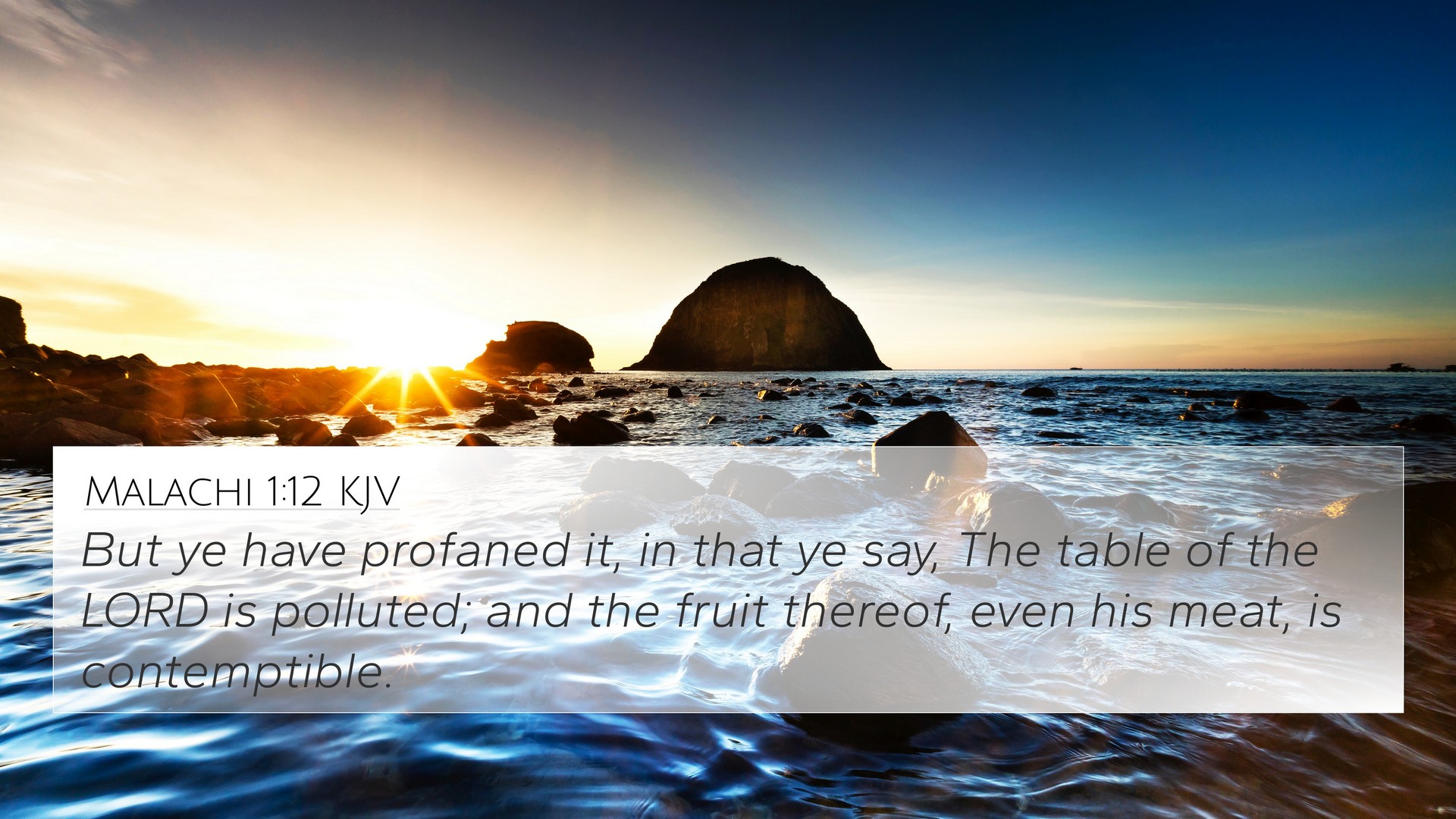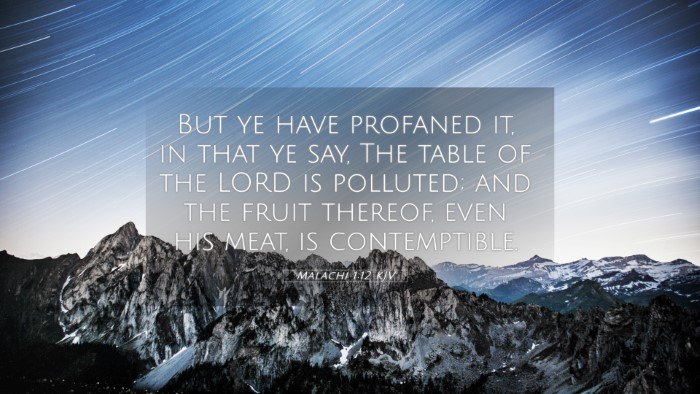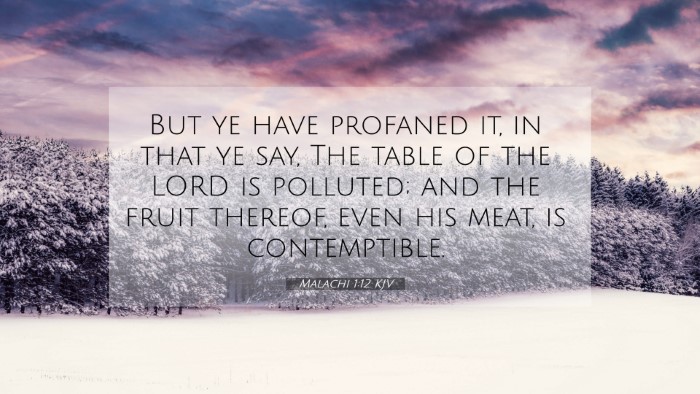Old Testament
Genesis Exodus Leviticus Numbers Deuteronomy Joshua Judges Ruth 1 Samuel 2 Samuel 1 Kings 2 Kings 1 Chronicles 2 Chronicles Ezra Nehemiah Esther Job Psalms Proverbs Ecclesiastes Song of Solomon Isaiah Jeremiah Lamentations Ezekiel Daniel Hosea Joel Amos Obadiah Jonah Micah Nahum Habakkuk Zephaniah Haggai Zechariah MalachiMalachi 1:12 Similar Verses
Malachi 1:12 Cross References
But ye have profaned it, in that ye say, The table of the LORD is polluted; and the fruit thereof, even his meat, is contemptible.
Uncover the Rich Themes and Topics of This Bible Verse
Listed below are the Bible themes associated with Malachi 1:12. We invite you to explore each theme to gain deeper insights into the Scriptures.
Malachi 1:12 Cross Reference Verses
This section features a detailed cross-reference designed to enrich your understanding of the Scriptures. Below, you will find carefully selected verses that echo the themes and teachings related to Malachi 1:12 KJV. Click on any image to explore detailed analyses of related Bible verses and uncover deeper theological insights.
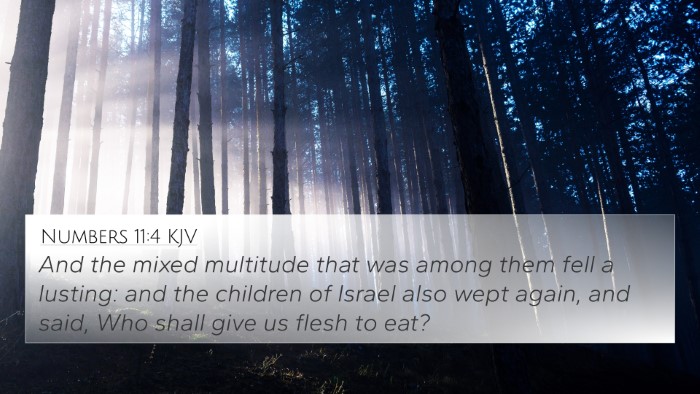
Numbers 11:4 (KJV) »
And the mixed multitude that was among them fell a lusting: and the children of Israel also wept again, and said, Who shall give us flesh to eat?
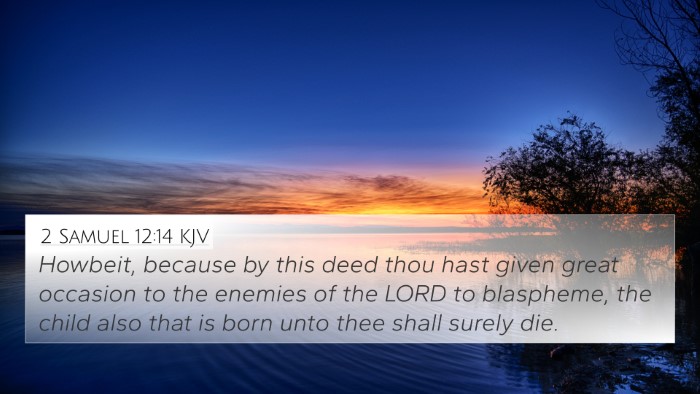
2 Samuel 12:14 (KJV) »
Howbeit, because by this deed thou hast given great occasion to the enemies of the LORD to blaspheme, the child also that is born unto thee shall surely die.

Ezekiel 36:21 (KJV) »
But I had pity for mine holy name, which the house of Israel had profaned among the heathen, whither they went.
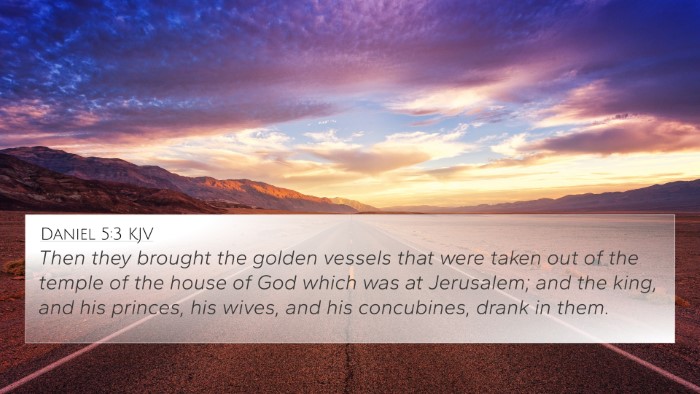
Daniel 5:3 (KJV) »
Then they brought the golden vessels that were taken out of the temple of the house of God which was at Jerusalem; and the king, and his princes, his wives, and his concubines, drank in them.
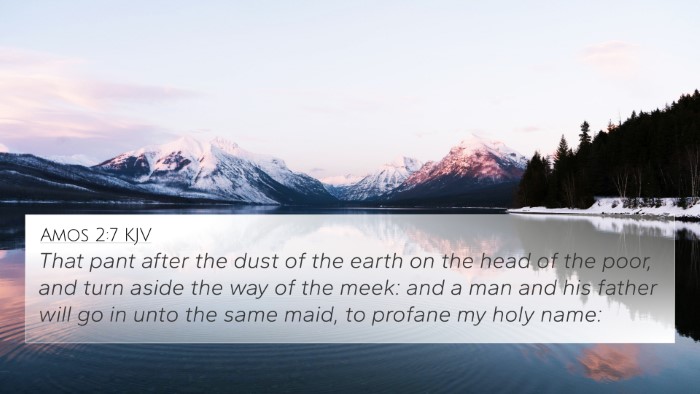
Amos 2:7 (KJV) »
That pant after the dust of the earth on the head of the poor, and turn aside the way of the meek: and a man and his father will go in unto the same maid, to profane my holy name:
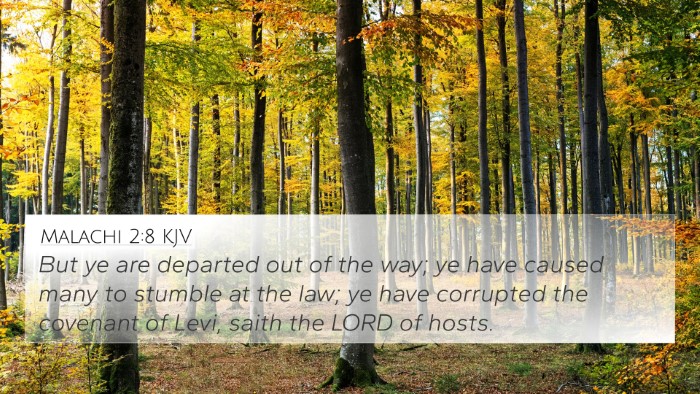
Malachi 2:8 (KJV) »
But ye are departed out of the way; ye have caused many to stumble at the law; ye have corrupted the covenant of Levi, saith the LORD of hosts.
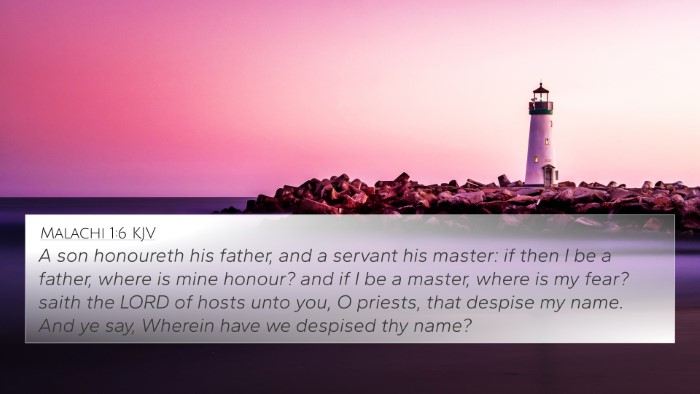
Malachi 1:6 (KJV) »
A son honoureth his father, and a servant his master: if then I be a father, where is mine honour? and if I be a master, where is my fear? saith the LORD of hosts unto you, O priests, that despise my name. And ye say, Wherein have we despised thy name?

Malachi 1:13 (KJV) »
Ye said also, Behold, what a weariness is it! and ye have snuffed at it, saith the LORD of hosts; and ye brought that which was torn, and the lame, and the sick; thus ye brought an offering: should I accept this of your hand? saith the LORD.
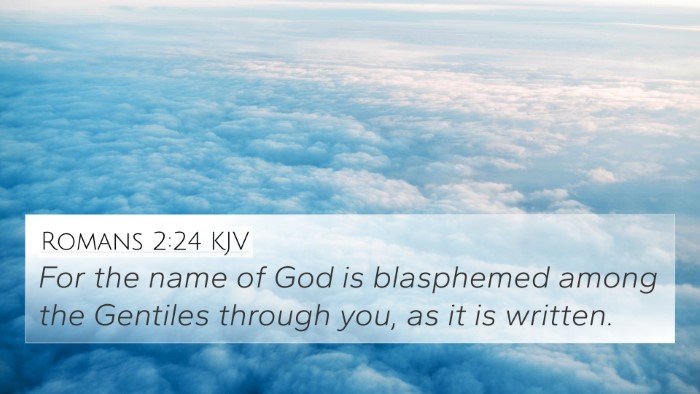
Romans 2:24 (KJV) »
For the name of God is blasphemed among the Gentiles through you, as it is written.
Malachi 1:12 Verse Analysis and Similar Verses
Understanding Malachi 1:12
Malachi 1:12 states, "But ye have profaned it, in that ye say, The table of the Lord is polluted; and the fruit thereof, even his meat, is contemptible." This verse acts as a significant warning against the attitudes and practices that undermine the sanctity of worship, particularly in how offerings to God are regarded.
Summary of Malachi 1:12
This passage reveals the Israelites’ neglect and disdain towards God’s commandments. The commentators emphasize that when God’s requirements for offerings and worship are disregarded, it not only reflects a lack of reverence but also invites God’s judgment. The phrase “the table of the Lord is polluted” indicates a serious pollution of worship and implies a deeper spiritual corruption.
Commentary Insights
- Matthew Henry: He asserts that "the table of the Lord” refers to the altar where sacrifices are made. Henry discusses how the people of Israel were failing to provide the reverence and quality that God required in sacrifices, thus polluting what was meant to be holy. He indicates the need for sincere hearts in worship.
- Albert Barnes: Barnes highlights that the contempt for offerings stems from a heart attitude. He connects this to the broader theme of worship, emphasizing that the fruit of offerings reflects our relationship with God. He suggests that treating sacred things as unholy leads to spiritual decay.
- Adam Clarke: Clarke elaborates on the seriousness of the accusation against the people for offering ‘contaminated’ sacrifices. He underscores that attitudes shape practices, and by holding God’s commands in contempt, they invite divine disfavor.
Cross-References Related to Malachi 1:12
Several scripture passages resonate with the teachings found in Malachi 1:12, enriching the understanding of its implications:
- Exodus 20:7: “Thou shalt not take the name of the Lord thy God in vain; for the Lord will not hold him guiltless that taketh his name in vain.”
- Isaiah 1:13-14: “Bring no more vain oblations; incense is an abomination unto me; the new moons and sabbaths, the calling of assemblies, I cannot away with.”
- Malachi 1:6: “A son honoreth his father, and a servant his master: if then I be a father, where is mine honor?”
- Jeremiah 7:21-23: “Thus saith the Lord of hosts, the God of Israel; Put your burnt offerings unto your sacrifices, and eat flesh.”
- Matthew 15:8: “This people draweth nigh unto me with their mouth, and honoreth me with their lips; but their heart is far from me.”
- Hebrews 12:28: “Wherefore we receiving a kingdom which cannot be moved, let us have grace, whereby we may serve God acceptably with reverence and godly fear.”
- 1 Peter 2:5: “Ye also, as lively stones, are built up a spiritual house, an holy priesthood, to offer up spiritual sacrifices, acceptable to God by Jesus Christ.”
Connecting Themes and Insights
Malachi 1:12 serves as a striking reminder of the importance of maintaining a respectful attitude towards God’s requirements for worship. The connection between this verse and others illustrates a thematic continuity through scripture regarding the nature of offerings to God:
- Veneration in Worship: Worship is depicted as a privilege that must be treated with honor and reverence (see Exodus 20:7; Hebrews 12:28).
- The Quality of Offerings: The expectation that what we offer to God reflects our hearts and is free from contempt is reiterated in both Malachi and the writings of Jesus (Matthew 15:8).
- Spiritual Sacrifices: The call to present oneself as a living sacrifice in the New Testament (1 Peter 2:5) indicates that spirituality consists not just in ritualistic gestures but in the sincerity of one’s devotion.
Tools for Further Study
For those interested in deepening their understanding of Malachi 1:12 and its interrelated themes within the Bible, here are some valuable tools:
- Access a Bible Concordance to find direct verses related to sacrificial laws and worship.
- Utilize Cross-reference Bible study methods to explore how various biblical texts interact.
- Employ a Cross-reference Bible study guide for thematic exploration of worship throughout both the Old and New Testaments.
Conclusion
Malachi 1:12 is a profound commentary on the nature of worship and the expectations that God has for His followers. By examining this verse alongside carefully chosen cross-references, believers can gain a richer understanding of the overarching themes of honor, sincerity, and reverence in their relationship with God.
